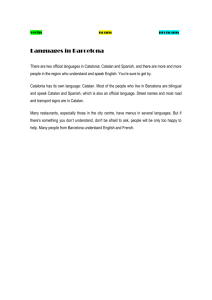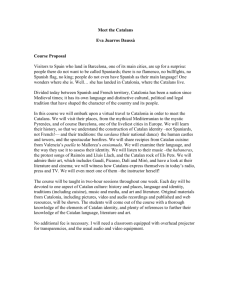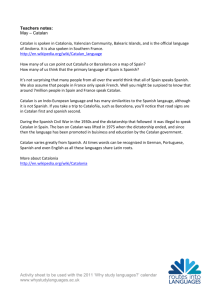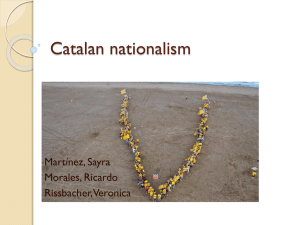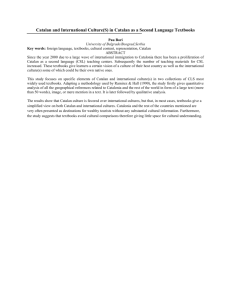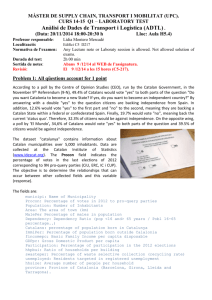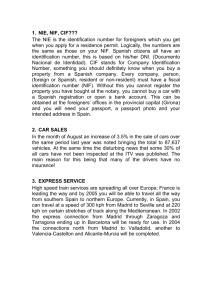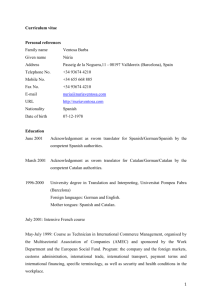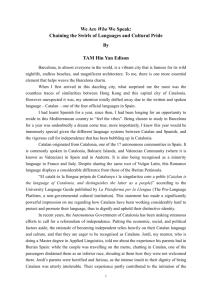Discourse on language policies in stateless nations
advertisement
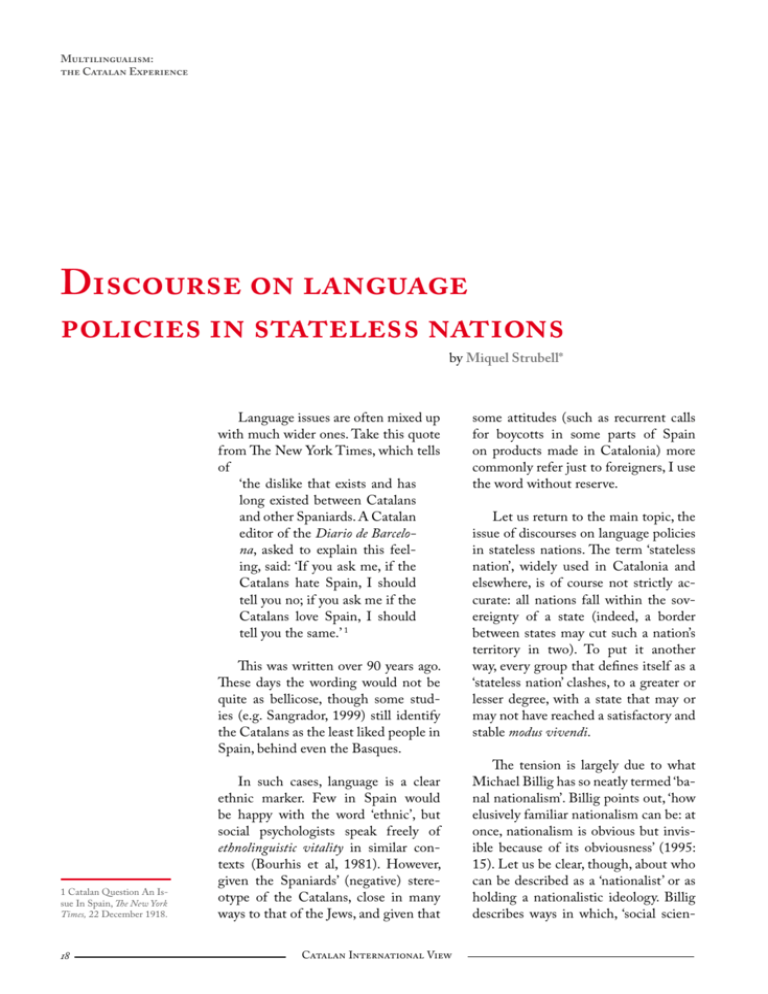
Multilingualism: the Catalan Experience Discourse on language policies in stateless nations by Miquel Strubell* Language issues are often mixed up with much wider ones. Take this quote from The New York Times, which tells of ‘the dislike that exists and has long existed between Catalans and other Spaniards. A Catalan editor of the Diario de Barcelona, asked to explain this feeling, said: ‘If you ask me, if the Catalans hate Spain, I should tell you no; if you ask me if the Catalans love Spain, I should tell you the same.’ 1 This was written over 90 years ago. These days the wording would not be quite as bellicose, though some studies (e.g. Sangrador, 1999) still identify the Catalans as the least liked people in Spain, behind even the Basques. 1 Catalan Question An Issue In Spain, The New York Times, 22 December 1918. 18 In such cases, language is a clear ethnic marker. Few in Spain would be happy with the word ‘ethnic’, but social psychologists speak freely of ethnolinguistic vitality in similar contexts (Bourhis et al, 1981). However, given the Spaniards’ (negative) stereotype of the Catalans, close in many ways to that of the Jews, and given that Catalan International View some attitudes (such as recurrent calls for boycotts in some parts of Spain on products made in Catalonia) more commonly refer just to foreigners, I use the word without reserve. Let us return to the main topic, the issue of discourses on language policies in stateless nations. The term ‘stateless nation’, widely used in Catalonia and elsewhere, is of course not strictly accurate: all nations fall within the sovereignty of a state (indeed, a border between states may cut such a nation’s territory in two). To put it another way, every group that defines itself as a ‘stateless nation’ clashes, to a greater or lesser degree, with a state that may or may not have reached a satisfactory and stable modus vivendi. The tension is largely due to what Michael Billig has so neatly termed ‘banal nationalism’. Billig points out, ‘how elusively familiar nationalism can be: at once, nationalism is obvious but invisible because of its obviousness’ (1995: 15). Let us be clear, though, about who can be described as a ‘nationalist’ or as holding a nationalistic ideology. Billig describes ways in which, ‘social scien- Dossier tists have projected and naturalized nationalism. Some do both simultaneously: “our patriotism” is made to seem “natural”, and thereby invisible, while “nationalism” is seen as a property of others’. In doing so, ‘they tend to overlook the nationalist aspects of “our” common sense’ (Billig 1995: 15). To illustrate his points, Billig primarily uses US examples. One may wonder whether Europe also displays such examples of ‘invisible’ nationalism. Given that no one disputes the claim that nation-states are a very European invention, it should not be hard to find that it does. The exorbitant claim that ‘le français est par excellence la langue de la liberté, de la culture et de la création’ was made by none other than M. Renaud Donnedieu de Vabres, France’s Minister for Culture and Communication (Délégation générale… 2004)2. Anthony Giddens defines the nation-state as ‘a set of institutional forms of governance maintaining an administrative monopoly over a territory with demarcated boundaries, its rule being sanctioned by law and direct control of the means of internal and external violence’ (Giddens 1985: 120). Billig (1995: 20) argues that, ‘nationalism embraces ways of thinking – patterns of common-sense discourse – which make this boundedness and monopolization of violence seem natural to “us”, who inhabit the world of nation-states’. Power brings ‘internal’ violence (also termed ‘symbolic violence’ by Bourdieu, in keeping with Billig’s reasoning). If indeed, forms of thought and perception are imposed on dominated social agents (and stateless nations easily see themselves falling into this category), they may well come to take the social order to be just. Those not conforming to these forms may then be seen - with righteous indignation - as deviating from the norm. By its very nature, this process is almost impossible for members of the dominant majority to perceive. I would argue that nowhere in Europe is language policy as hotly contested as it is in Spain, with regard to Catalonia’s policy If a stateless nation is literally powerless, symbolic violence may be exercised solely against individuals. However, a process of political devolution may easily lead to heated reactions to policies. As the parent of a schoolgirl in Wales asked, for instance, ‘Why should she have to be forced to learn a useless language when the rest of the entire world is learning English!?’ (Lyon 1996: 109). I would argue that nowhere in Europe is language policy as hotly contested as it is in Spain, with regard to Catalonia’s policy. Though there is arguably a general social consensus supporting the policy inside Catalonia, some of the Spanish media have it as their battle cry. They have given support to a number of groups aiming to save Spanish from what they see as its imminent demise in Catalonia: the conservative Madrid daily ABC was quick to highlight the formation of Coordinadora de Afectados en Defensa del Castellano (CADECA), just a few days after it was set up in the town of Salou, apparently by Spanish employees of a petrochemical complex (Colomer, 1993: 25). Another conservative Madrid paper, El Mundo, gives ample space to organisations such as Acción Cultural Miguel de Cervantes, Asociación por la Tolerancia, Profesores por el Bilingüismo and Convivencia Cívica Catalan International View 2 In his preface to the Rapport au Parlement sur l’emploi de la langue française (2004) written by the Délégation générale à la langue française et aux langues de France. He continues: ‘Parce qu’elle exprime le rayonnement de la France et de tous les pays qui l’ont en partage, elle est le vecteur de la diversité culturelle dans un monde où la pluralité des langues répond aux polyphonies de l’esprit. C’est dire l’enjeu de la politique linguistique, au coeur de nos politiques culturelles. D’autant qu’en veillant à la place du français sur notre propre territoire, nous favorisons son usage en Europe et dans le monde. C’est pourquoi la promotion de la langue française et celle du plurilinguisme sont deux causes solidaires, que le gouvernement défend avec détermination’. 19 Multilingualism: the Catalan Experience Catalana, which all share the same dominant discourse regarding language (e.g. Cordero, 2008). Perhaps the most grotesque example (from a Catalan perspective) was the ABC cover page on September 12th 19933, entitled ‘Igual que Franco pero al revés: persecución del castellano en Cataluña’ (‘The same as Franco, but in reverse: the persecution of Spanish in Catalonia’). This is not a surprising attitude for this paper. In his book L’anticatalanisme del diari ABC (19161936) Jaume Medina claims that, ‘ABC’s intransigent and intolerant anti-Catalanism is by no means recent; it is inextricably attached to its very nature and has functioned regularly and consistently since its very origin [in 1905] (Medina 1995: 31. Author’s translation). 4 The international press often tends to allow its reports to be coloured by the Madrid press, rather than by onsite data gathering, or at least by each side being invited to put its case 3 http://hemeroteca.abc. es/nav/Navigate.exe/ hemeroteca/madrid/ abc/1993/09/12/001.html 4 Original text: “L’anticatalanisme intransigent i intolerant d’ABC no és pas una cosa nova d’ara, sinó que és indestriable de la seva mateixa condició i [...] funciona amb regularitat i constància des dels seus mateixos inicis”. 5 Original text: “Nunca fue la nuestra lengua de imposición, sino de encuentro; a nadie se le obligó nunca a hablar en castellano: fueron los pueblos más diversos quienes hicieron suyos por voluntad libérrima, el idioma de Cervantes”. 20 Apart from a determined effort to claim that Spanish-speaking parents have a ‘right’ to choose the language of instruction of their children during their schooling (despite a Constitutional Court ruling that Catalonia’s legislation is legitimate), they have protested (despite another Constitutional Court ruling supporting Catalan legislation) because civil service jobs in Catalonia require a sufficient command of both official languages. Spanish is official in Catalonia (and indeed throughout Spain), regardless of the number of Spanish-speakers living there; nevertheless they claim that Spanish has to be regarded in the same way that Catalan is, as Catalonia’s own Catalan International View language (llengua pròpia de Catalunya). Even the King of Spain has fallen into the invisibility trap. On April 23rd 2001, he claimed in a speech that Spanish had never been imposed. ‘Ours was never a language of imposition, but of encounter; no-one was ever forced to speak in Spanish: the most diverse peoples made the language of Cervantes their own, entirely by exercising their free will. (Author’s translation)5 Significantly, press attacks tend to come at times of political uncertainty, especially when the Spanish socialist party has to negotiate a stable parliamentary majority with Catalan (or Basque) parties. Such was the case in 1993, and again in 2008, when a ‘Manifiesto por la llengua común’ was published in a Madrid paper by 18 academics, writers and journalists, some of whom had launched the so-called Foro Babel some years earlier, with the same intention. The media impact of this text has been enormous.6 Basing their reasoning on the fact that according to the Constitution, ‘all Spaniards are duty-bound to know it and have the right to use it’,7 they call on the Spanish parliament to take measures to perpetuate the supremacy of Spanish throughout Spain, a renovated discourse of the long-standing aim of one nation, one language, one culture. The term ‘nation’ also forms part of the offensive: while ‘nationalists’ are defined as those in Basque, Catalan and Galician parties, those associated with Spanish parties (chiefly, PSOE and PP) are portrayed as ‘non-nationalist’ or even ‘constitutionalist’ parties.8 Paradoxically, both the PSOE and the PP cut references to ‘nation’ and ‘national’ from the 2005 draft Catalan statute of autonomy (adopted in the Catalan parliament by a 89% vote in favour), during its passage Dossier through the Spanish Cortes (Parliament) - almost at the same time as the Parliamentary Assembly of the Council of Europe adopted a Recommendation on the use of the concept of ‘nation’, calling for tolerance and understanding. Only 2 out of 10 references were retained in the Preamble, and 3 out of 11 in the articles – of which two are the constitutional word ‘nationality’. What also concerns me is that the international press often tends to allow its reports to be coloured by the Madrid press, rather than by onsite data gathering, or at least by each side being invited to put its case. We read of ‘cultural separatism’, of Spanish losing out, and of ‘centrifugal’ forces, for instance, in a recent Financial Times report: languages in schools and other areas of public life, particularly in Catalonia. Such policies inevitably implemented at the expense of Castilian, the Spanish language - spark occasional heated protests from Spanish nationalists. Language, though, is only the most visible sign of the centrifugal forces at work in modern Spain’ 9. Having said all this, the anti-Catalan discourse has long since moved beyond the primitive discourse of the Franco regime, which devised slogans such as ‘No ladres como un perro!’, ‘Habla la lengua del imperio!’ and ‘Habla cristiano!’ (‘Don’t bark like a dog’, ‘Speak the language of the Empire’, ‘Speak Christian’). 6 A Google search for “manifiesto por la lengua común” yields 106,000 web pages! 7 Literally, “Todos los españoles tienen el deber de conocerla y el derecho a usarla”. 8 PSOE stands for Partido Socialista Obrero Español, that is, Spanish Socialist workers’ Party; and PP stands for Partido Popular, the main Spanish conservative party. 9 Victor Mallet, ‘Flimsier footings’, Financial Times, August 19th 2009. ‘Cultural separatism can be seen in the promotion of local *Miquel Strubell British-born, received most of his education in England, including an Hons B.A. in Psychology and Physiology and an M.Sc. in Psychology of Education. He worked for the Catalan government for 19 years in the Catalan language promotion unit, and has worked as a lecturer at the Universitat Oberta de Catalunya for the past ten years, specialising in European language policies, minority language communities and sociolinguistics. He has been on a number of missions for the OSCE Higher Commissioner for National Minorities and the Council of Europe. Bibliography Billig, Michael. (1995). Banal Nationalism. London: Sage. Bourhis, Richard Y.; Howard Giles & Doreen Rosenthal (1981). Notes on the construction of a subjective vitality questionnaire for ethnolinguistic groups. Journal of Multilingual and Multicultural Development 2:145–155. Colomer, V. (1993). ‘Los defensores del uso del castellano en las aulas de Cataluña crean una asociación’, ABC, 15th November, p. 25. http://hemeroteca.abc.es/nav/ Navigate.exe/hemeroteca/madrid/abc/1993/11/15/025. html Cordero, Dani et al. (2008). ‘Asociaciones que defienden el castellano en Cataluña, Galicia y País Vasco deciden aliarse’, El Mundo, 23rd March. http://www.elmundo.es/ papel/2008/03/23/espana/2351368.html Council of Europe (2006). Recommendation 1735 (2006). Text adopted by the Parliamentary Assembly of the Council of Europe on 26th January 2006 (7th Sitting), on the concept of ‘nation’. http://assembly.coe.int/main. asp?Link=/documents/adoptedtext/ta06/erec1735.htm Délégation générale à la langue française et aux langues de France (2004). Rapport au Parlement sur l’emploi de la langue française. http://www.culture.gouv.fr/culture/ dglf/rapport/2004/Rapport_au_parlement_2004.pdf Giddens, Anthony (1985). A Contemporary Critique of Historical Materialism. Vol. 2. The Nation State and Violence. Cambridge: Polity. Lyon, Jean (1996). Becoming bilingual: language acquisition in a bilingual community. Clevedon: Multilingual Matters Ltd. Mallet, Victor (2009). ‘Flimsier footings’, Financial Times, 19th August. http://www.ft.com/cms/s/0/ e8f7e700-8c57-11de-b14f-00144feabdc0.html Medina, Jaume (1995). L’anticatalanisme del diari ABC (1916-1936). Barcelona: L’Abadia de Montserrat. Sangrador, J. L. (1999). Identidades, actitudes y estereotipos en la España de las autonomías. Madrid: CIS. Catalan International View 21
